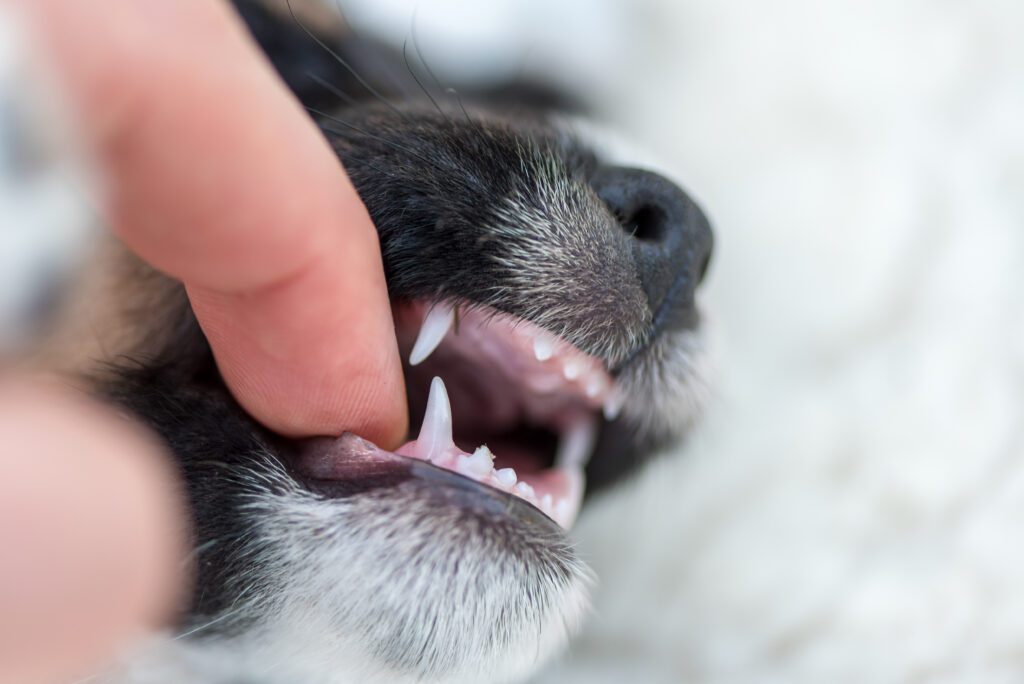Do Puppies Lose Teeth?

Every pet owner remembers the joy of bringing a new puppy home. Those early days are filled with adorable moments and a few challenges, one of which is puppy teething. Many pet owners often wonder, “Do puppies lose teeth?” The answer is yes, puppies, just like human babies, go through a teething process. In this comprehensive guide, we’ll explore the phases of puppy teething, symptoms to watch for, the importance of professional veterinary care, and tips for managing your puppy’s teething at home. For personalized advice and care, Sahara Pines Animal Hospital in Las Vegas, NV, is here to help. Feel free to call us at (702) 876-7580 or request an appointment online.
Recognizing Teething Symptoms in Puppies
Teething can be a tough time for puppies and may lead to various symptoms. Common signs include:
- Increased chewing or biting
- Drooling
- Mild swelling of the gums
- Occasional slight fever
- Irritability
- Lack of appetite
These symptoms are typical but keeping a close eye is crucial to ensure they don’t escalate into something more serious.
The Phases of Puppy Teething
Puppy teething is an important developmental stage, beginning as early as 3 weeks old and typically concluding around 6 months of age. This process can be broken down into several key phases, each characterized by the emergence of different types of teeth and varying degrees of discomfort for your puppy.
- The Emergence of Baby Teeth (3-6 weeks): During this initial phase, your puppy will develop their deciduous teeth, commonly known as baby teeth. This includes the growth of incisors, canines, and premolars. Although puppies are still nursing during this time, you may start to notice them nibbling or gnawing as their teeth begin to emerge.
- Transition to Adult Teeth (12-16 weeks): As your puppy grows, their baby teeth will start to fall out, making way for their permanent adult teeth. This transition begins with the incisors and is followed by the development of canines and premolars. It’s common to find these tiny baby teeth around your home during this phase.
- Completion of Adult Dentition (6-7 months): By the time your puppy reaches 6 to 7 months of age, they should have a full set of adult teeth, totaling 42 in number. This final phase marks the end of the teething process, with the last of the molars coming in.
When to Seek Professional Veterinary Care
While teething is a natural process, certain symptoms indicate the need for professional pet dental care. If your puppy exhibits excessive drooling, prolonged loss of appetite, severe gum swelling, or if you notice any bleeding, it’s time to contact your vet. These could be signs of complications like an infection or impacted teeth. Sahara Pines Animal Hospital provides expert care for such issues. Don’t hesitate to call us at (702) 876-7580 for guidance.
Ensuring Your Puppy’s Dental Health
Professional veterinary care plays a pivotal role in ensuring your puppy’s dental health. Regular check-ups allow vets to monitor teething progress and catch any potential issues early. During these visits, vets can also offer advice on proper dental hygiene and suggest appropriate teething toys or foods. Regular dental care is key to preventing future dental problems and maintaining overall health.
Managing Your Puppy’s Teething at Home
When your puppy is going through the teething process, there are several effective strategies you can employ at home to help manage their discomfort and ensure they’re safe and happy:
- Providing Suitable Chew Toys: Offering a variety of chew toys is one of the best ways to soothe your puppy’s sore gums. Look for toys that are specifically designed for teething puppies, made from safe, durable materials. Rotating these toys will keep your puppy interested and help prevent them from chewing on inappropriate items.
- Using Cold Items to Soothe Gums: Just like with human babies, cold can help numb and soothe a puppy’s sore gums. You can offer chilled (not frozen) teething toys or even a wet washcloth that’s been cooled in the refrigerator. Be sure to supervise your puppy to ensure they don’t chew off and swallow any pieces.
- Maintaining a Regular Feeding Schedule: Teething can sometimes cause puppies to lose their appetite. It’s important to stick to a regular feeding schedule and offer nutritious, soft food that’s easier on their sensitive gums.
- Gentle Play and Distraction: Engaging your puppy in gentle play can help distract them from the discomfort of teething. Short, interactive games can be a good way to engage their mind and reduce the focus on their teething discomfort.
- Monitoring Chewing Behavior: Keep a close eye on what your puppy chews on. Puppies are naturally curious and may chew on things that could be harmful, like electrical cords or small objects that could be swallowed.
- Puppy-Proofing Your Home: Ensure your home is safe for a teething puppy by removing or securing anything they shouldn’t chew on. This includes household items, plants, and anything else that might be harmful if ingested.
- Providing Dental Health Treats: There are various puppy treats available that are designed to promote dental health. These can help clean your puppy’s teeth and reduce tartar build-up. Always choose treats appropriate for your puppy’s size and age.
Remember, while these tips can be helpful, every puppy is different and may require individualized care. If you have concerns about your puppy’s teething or if they seem excessively uncomfortable, it’s always best to consult with a professional. Sahara Pines Animal Hospital is here to provide guidance and support.
Your Partner in Your Puppy’s Health Journey
Dealing with puppy teething can be challenging, but understanding the process and knowing when to seek professional help are key to navigating this phase successfully. At Sahara Pines Animal Hospital, we’re committed to supporting you and your puppy through every stage of their development. For any concerns or questions about puppy teething, or to schedule an appointment, call us at (702) 876-7580 or visit us online. Let’s ensure your puppy’s journey to a healthy adult life is smooth and happy!
Recent Posts
About Sahara Pines Animal Hospital
For exceptional veterinary care in an environment that welcomes you as family, partner with Sahara Pines Animal Hospital and we’ll help you meet all your pet’s needs for a lifetime.




